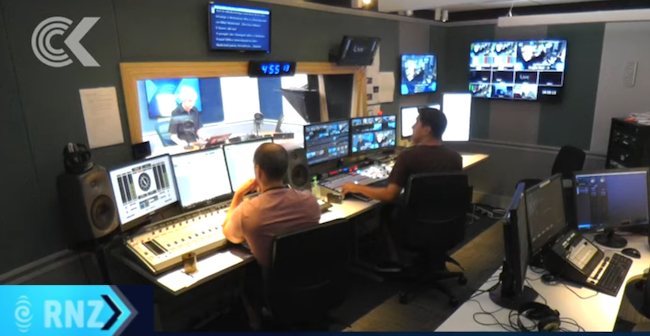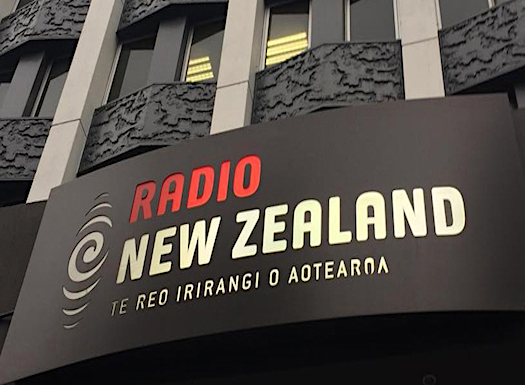New Zealand’s public broadcasters are being reviewed by the government as it seeks to decide how to structure them for the future.
Radio New Zealand (RNZ) and TV New Zealand (TVNZ) are separate government business entities. The government is considering many options for them in the future, perhaps a merger or possibly even closing them both and opening a new converged public broadcaster.
Many years ago, RNZ was forced to sell its popular and profitable stations and was left with three networks under its public service mandate: National Radio. Concert and RNZ International (RNZI) now known as RNZ Pacific. It is funded through money from a government trust called NZ On Air, and some of the tv and radio outlets are allowed to supplement income by taking limited advertising.
A report by RNZ News says the government has “signed off on a high-level decision to proceed and to commission a business case,” after the Minister for Broadcasting presented a revised paper to Cabinet this week. It is understood that the proposal to “disestablish” the current public broadcasters and start again is now off the drawing board, but a merger of the existing broadcasters is still in active consideration.
The plan now seems to be to beef up the public service broadcasting mandate, perhaps with a charter similar to the BBC model and to make content available across many platforms if the two organisations are merged. It is not known if advertising will be allowed.
The impetus for change comes as the country’s media grapple with the challenges of increased competition from international competitors in the new media age. “The plan was to work towards having the new media company in place by about 2023 and that appears to still be the goal,” reports RNZ News.
The National Party is believed to oppose any plans to merge the radio and tv operations, but is aware of the challenges facing broadcasters in the new media era. According to a report from competitor NewsTalkZB the Nationals believe “something’s got to be done. We cannot just stand by in all these new circumstances with the media fighting for their lives against international competition…We are against any big mega giant merger of two entities that will become so big they will basically eat the other media outfits up.”




Could this story could be a blueprint for reform of our ABC and SBS?
Calls to reform the ABC and SBS have been around since the idea to merge the ABC and SBS in the 1980s. My reaction is only but one. Ideas to reform the ABC and SBS will continue.
The relevant issues inspired by this article that could be applied included:
* Merging the ABC and SBS but at the same time mandate multicultural broadcasting.
* Reviewing the charters of the ABC and SBS especially if the ABC and SBS are merged.
* Selling off or closing some of the digital radio and tv stations?
* changing the funding models of the ABC and SBS - continue appropriations from the Parliament, allow advertising on the ABC or the merged entity.
When considering reforms to the ABC and SBS it could involve flattening the hierarchical staffing structures. I person I knew who worked at the ABC said that during the industrial dispute of 1991, more managers were hired than actual workers.
When considering any kind of reform of the ABC and SBS you have to ask whether the following can continue:
When was the last time you have seen or heard any investigative reporting or serious reporting or analysis of current affairs on commercial media? Perhaps the early 1980s 2GB had an investigative program called "Newsfront" and Channel 9 had until the 1990s "The Sunday Program".
We could also remark about the absence of educational material on commercial media. Only on the ABC! It started with schools programming on ABC Radio 2 (for example 2FC which is now RN) and the 1000-1500 timeslot on ABC TV.
With the expansion of the internet, it is only natural that the ABC have a presence on the web. The ABC was a pioneer with podcasts and the dissemination of educational material in topics such as mathematics, English, the humanties and the sciences, for example at https://education.abc.net.au/home#!/games. Show me any commercial broadcaster educating its audience.
Therefore when considering any reform of the ABC and SBS ask yourself whether investigative reporting and educational material will continue under a reformed ABC and SBS.
But then you have to ask whether the ABC and SBS have spread themselves too thin with the expansion of digital radio and tv channels and expanding the ABC's services to include a lifestyle channel on the web, https://www.abc.net.au/life/.
Much of the latter could be regarded as consumer affairs that was once covered on "The Investigators" (1980s ABC-TV) and as recently in "The Checkout". At least it is not sponsored content such as those on other websites or the former "Talking Lifestyle" (2UE, 3EE and 4BH).
The idea of reforming the ABC and SBS has been around since 1980s and will continue.
Thank you,
Anthony of exciting Belfield
If you want more money for the ABC/SBS to pay for investigative reporting etc then;
1. Switch off their 38 AM/FM transmitters in capital cities. DAB+ has been transmitting in state capitals for 10 years and now the other capitals have been added. Only one high powered DAB+ transmitter for ABC/SBS is in each city with a few very low powered repeaters. Norway did this with their government network and ratings returned to their previous values within 12 months.
Commercial stations can also make savings in a similar way.
2. Convert ABC/SBS in regional areas to VHF band 1 (the vacant TV channels 0 -2) DRM to transmit the same number of government channels as DAB+ does in the capital cities. The frequency is a quarter of DAB+ which will greatly extend the coverage areas. One high powered transmitter per TV transmitter site.
3. Transmit high frequency (Short Wave) at high power DRM from the geographic centre of Australia to cover all of Australia with Newsradio and Grandstand, with the ability to transmit Emergency Warning System. This is to cover the 400,000 Australians who cannot receive mobile phone or radio whilst mobile.
The current transmission system is very wasteful in money, electricity and causes lots of carbon dioxide to be produced at power stations.
Radio New Zealand Pacific has been transmitting high powered high frequency program to the Pacific for 14 years. Pity they don't transmit DRM+ domestically as well for the same reasons.
If the ABC/SBS waste lots of money in the transmission of their radio programs. This happens because the ABC and SBS have never been responsible for transmission. Currently it is subcontracted to Broadcast Australia.
If the ABC and SBS switched off their 37 AM/FM stations leaving their 7 DAB+ transmitters which have been transmitting those programs plus new ones for 10 years there would be a big drop in electricity consumption and maintenance costs.
In regional areas most areas are covered by 6 programs using AM and FM. If a DRM transmitter using the old analog TV channels 0 - 2 were located on each TV transmitter site they could radiate the same number of programs that capital city ABC/SBS DAB+ listeners get now. DRM in this band is a quarter of the transmission frequency of DAB+ thus extending the coverage area required in rural areas. Commercial radio could use another DRM+ transmitter to transmit their current AM and FM programs through a single transmitter with the antenna on the FM transmitter's tower.
3. Install a high powered high frequency (short wave) transmitter in the geographic centre of Australia transmitting ABC NewsRadio and ABC Grandstand from a single transmitter. It should be equipped to transmit the Emergency Warning System since this area is well away from bushfires, cyclones, floods and foreign treats. Remember that 400,000 remote Australians excluding truck drivers and other itinerant workers have no radio or mobile phone once they leave their village or homestead.
The Department of Communications then needs to set analog cut off dates.
I concur with Mr StJohn.
A technicality, an analogue switch off has to be mandated by the Parliament who then tell the correct authority administering the Act to switch off analogue transmissions in the same way that in 1998 Parliament mandated for digital TV transmission with a simultaneous analogue/digital transmission with a series of analogue tx switch off dates.
On a historical note, the ABC's tx facilities have always been administered first by the Austrlaian Post Office, Telecom Australia then Telstra and the now privatised BA. That is the ABC has never ran its tx facilities.
Nevertheless the radio and TV tx sites are funded by the ABC through an appropriation from Parliament which comes from you and I.
In recent times there has been much discussion on climate change on the ABC whether it's on RN, Metropolitan (2BL, 3LO), "The Drum" (TV and ABCNewsRadio) and Q&A. It is worth pointing that there are many high-powered radio tx sites of at least 50kW and 100kW whether AM or FM. For a broadcaster, the ABC would have to be the biggest emitter of CO2 through the consumption of power, Even if carbon credits are used to offset CO2 (note I don't know if the ABC is involved in carbon credits to atone for their environmental sins), it still means that same amount of CO2 will be generated somewhere else shifting the generation of CO2 elsewhere.
In essence, the ABC could well save energy and reduce CO2 emissions if it did pursue DRM transmission of its radio signal. That qualified such that the Parliament make an Act of Parliament to mandate an analogue switch off with a simulcast phase in. Once the Act is enacted, it is up to the suitable authority to administer it. Why I say "suitable authority" instead of DoCA is that there is always a renaming of the authorities.
The way our administration of the law operates is that depending on the Act, the "suitable authority" administering the act cannot act autonomously.
In essence I agree with Mr StJohn's crusade for digital transmission of radio signals via DRM. Let's not forget that retailers and radio manufacturers have a part to play in supplying the radios. In addition I wrote elsewhere that DRM could well be Australia's soft power solution for the re-introduction of SW broadcasts.
Thank you,
Anthony of thinking Belfield
In my previous posting about 11th February 2020 at 1823 on the 4th last paragraph, I mentioned my non-support for carbon credits in case the ABC uses them to atone for their environmental sins, I avert to the UN's article about carbon credits
source article: https://www.unenvironment.org/news-and-stories/story/carbon-offsets-are-not-our-get-out-jail-free-card. While the purpose of CO2 credits was to offset emitters exceeding their limits by funding tree planting for example, the final subheading in the article says it all by saying that it is an "illusion...." allowing emissions to continue to grow.
Returning to broadcasting stations especially our ABC, it behooves those interested in the power output of our AM and FM transmitters especially those of the ABC to read the publication spreadsheet produced by the ACMA at https://www.acma.gov.au/sites/default/files/2020-02/BroadcastTransmitterExcel.zip. Look at the column of output power, and in the broadcasting industry, our ABC is the biggest emitter of CO2.
Thank you,
Anthony of supplementary info Belfield